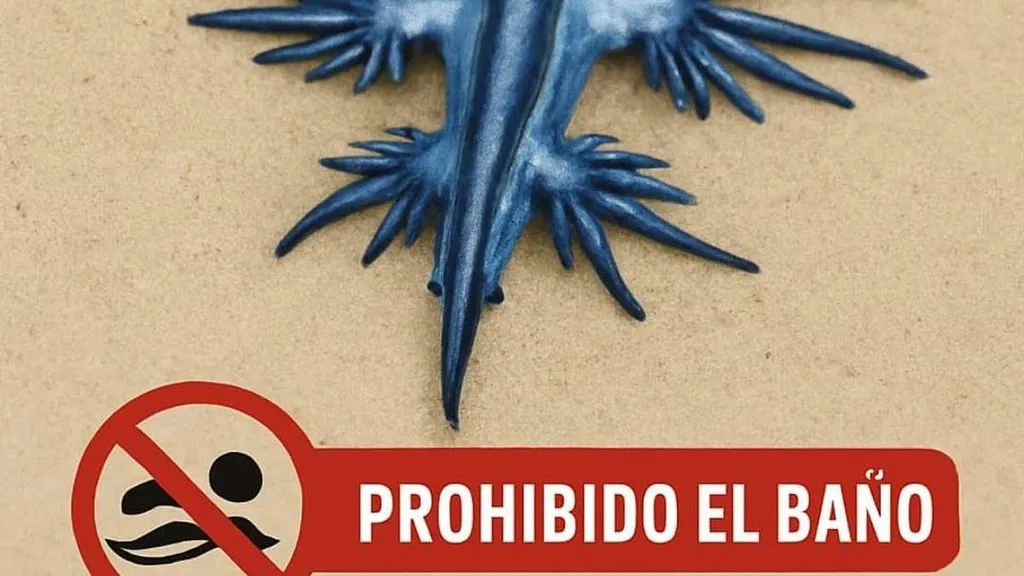Another Spanish beach has closed after the invasion of the potentially deadly blue dragon sea creatures as the venomous species continues to spread across the country.
The dangerous creatures, which have a potentially-fatal sting, were spotted on La Cantería beach in Órzola, in the popular holiday island Lanzarote, forcing the beach to temporarily close this week.
Several sightings of the sea slugs, also known as Glaucus atlanticus, have been reported along the Lanzarote coast over the summer.
It comes as tourists were banned from going into the water along an entire seven-mile stretch of Spain's Costa Blanca.
Red flags went up on beaches in the municipality of Guardamar del Segura just north of Torrevieja on Wednesday following the appearance of so-called blue dragons, which have been branded 'the most beautiful killer in the ocean'.
The species feed on the venomous cells of creatures like the deadly Portuguese man o'war, storing them within its body in concentrated doses.
It then recycles the venom, which allows it to paralyze prey 300 times its own size.
This process concentrates the toxin, making the blue dragon's poison far more potent than that of its prey. If someone handles or steps on the creature, it can release these stinging cells into the skin.
Tourists were last week banned from going into the water along an entire seven-mile stretch of Spain's Costa Blanca because of the rare creatures.
The dangerous creatures, which have a potentially-fatal sting, were spotted on La Cantería beach in Órzola, in the popular holiday island Lanzarote.
The Spanish beach has closed after the invasion of the potentially deadly blue dragon sea creatures as the venomous species continues to spread across the country.
Typical symptoms of the blue dragon's sting include nausea, pain, vomiting and, in some cases, dangerous allergic reactions.
While most stings are not deadly, they can be fatal for people with severe allergies, children or people with heart/respiratory conditions, and someone who has been stung multiple times.
Swimming in Guardamar del Segura remains banned as of Monday. The beach had reopened on Thursday but was closed again on Sunday due to the continued presence of the species.
The town council urged 'extreme caution' and asked beachgoers to avoid touching the animals and to call the police or lifeguard service if they are spotted.
'If this animal bites you, it is advisable to pour salt water on the area, apply a cold cloth, and go to the beach lifeguard center', they added.
On Wednesday, Guardamar del Segura's mayor Jose Luis Saez confirmed the sea ban order.
In a post on X, he wrote: 'Red flag on the beaches of Guardamar.
'Bathing is prohibited following the appearance on Vivers Beach of two specimens of Glaucus atlanticus, known as the Blue Dragon.'
The dazzling blue creature absorbs the stinging cells from its food and stores them in concentrated doses, giving it a far more potent sting than its prey.
The sea slug, also known as Glaucus atlanticus, feeds on the deadly Portuguese man o' war and other venomous creatures.
He added: 'We remind people that despite its bright and striking colour and it's small 1.5 inch size, they should stay away from this animal because of its sting.
'Guardamar del Segura Town Hall has has launched a preventive operation to detect possible specimens carried by ocean currents.
'Town hall workers are closely following the evolution of the situation and will inform people about the different measures to be taken.
'If you see one of these creatures don't touch it, even with gloves on, alert lifeguards and other authorities.
'If you get stung, wash the area affected with salt water and head to your nearest first aid point or health centre.
'These creatures are poisonous and their stings can cause nausea, pain and vomiting.
'For the time being and until further notice, bathing in the sea is prohibited.'
But Vivers Beach, a natural stretch of coast south of the Segura River and north of La Babilonia Beach, was said to be full of people despite the ban.
However, fewer people than normal were said to be in the sea defying the bathing ban order and risking heavy fines.
Meanwhile, red flags went up at Santa Barbara beach in La Linea de la Concepcion near Gibraltar a week earlier after police received an emergency call about a blue dragon sighting and six were later found on the shoreline.
This is not the first time dangerous sea creatures have caused chaos for swimmers in Costa Blanca.
In 2018, bathers were told to avoid the ocean after the reappearance of Portuguese men o'war.
An 11-year-old boy was rushed to hospital after being stung by one of the jellyfish-like creatures on the few beaches that remained open on some of the most popular parts of the coastline with British holidaymakers.
Blue dragons are rarely seen in the Mediterranean and usually live in the more tropical conditions in the Atlantic, Pacific and Indian Oceans.
